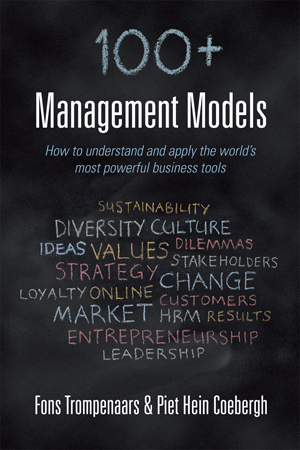The only management models book you will ever need
14 September 2014 by Catherine Holdsworth in 100+ Management Models, Business and finance
Hundreds of models have been developed to track, measure and forecast business solutions, but as fashions shift how can we apply these theoretical frameworks effectively in real organizations?
Now, for the first time, business leaders can find all the most important models in one place. 100+ management models, the new book from international management experts Fons Trompenaars and Piet Hein Coebergh is a handy reference containing precise summaries of more than 100 classic management models. Each model is presented clearly and concisely, showing what problem it is intended to solve and how it might be used within an organization. All models also contain a helpful visualisation to aid understanding.
 Each model is categorised under one of nine approaches to business: sustainability, innovation and entrepreneurship, strategy, diversity of cultures, customers, human resource management, benchmarking and results, leadership, and implementation. At the end of each section there is a summary of the key dilemmas that tend to emerge from the particular function. This is an ideal book for both university students on management courses and business strategists wishing to find out which management models can work best for their organization.
Each model is categorised under one of nine approaches to business: sustainability, innovation and entrepreneurship, strategy, diversity of cultures, customers, human resource management, benchmarking and results, leadership, and implementation. At the end of each section there is a summary of the key dilemmas that tend to emerge from the particular function. This is an ideal book for both university students on management courses and business strategists wishing to find out which management models can work best for their organization.
You can view the contents list and see some sample models on this page.
Fons Trompenaars is the world’s leading cross cultural management expert. He is founder and director of Trompenaars Hampden-Turner (THT), a renowned consulting firm in the field of intercultural management. He is the author or co-author of eleven books on culture and business, including the global bestseller, Riding the waves of culture. His books have been translated into a dozen languages. Piet Hein Coebergh is an expert in formulating and communicating corporate strategy. He is lecturer at the University of Applied Sciences Leiden and managing consultant at Coebergh Communications & PR. He is author or co-author of a dozen books and articles on communication, governance and e-commerce.
‘I highly encourage students, academics and leaders in business and government to take note of the latest sustainable business models, theories and best-practices set out in this book. The reason is straightforward: we all have a responsibility to make the much needed transformational change towards a more sustainable and equitable world.’
Paul Polman, CEO Unilever and Chairman World Business Council for Sustainable Development (WBCSD)

